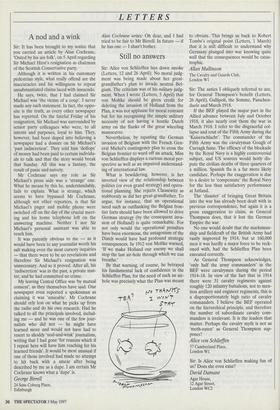Sir: The antics I obliquely referred to are, for General
Thompson's benefit (Letters, 26 April), Gallipoli, the Somme, Passchen- daele and March 1918.
If the BEF played the major part in the Allied advance between July and October 1918, it also nearly cost them the war in March 1918. I refer to the disgraceful col- lapse and rout of the Fifth Army during the `Kaiserschlachf. The commander of the Fifth Army was the cavalryman Gough of Curragh fame. The efficacy of the blockade by the Royal Navy is a highly controversial subject, and US sources would hotly dis- pute the civilian deaths of three quarters of a million. Spanish flu is a far more likely candidate. Perhaps the exaggeration is due to a desire to 'compensate' the Royal Navy for the less than satisfactory performance at Jutland.
The 'disaster' of bringing Great Britain into the war has already been dealt with in previous correspondence, but again it is a gross exaggeration to claim, as General Thompson does, that it lost the German Empire the war.
No one would doubt that the marksman- ship and fieldcraft of the British Army had vastly improved by 1914, but at 160,000 men it was hardly a major force to be reck- oned with, had the Schlieffen Plan been executed correctly.
As General Thompson acknowledges, `only half the army commanders' in the BEF were cavalrymen during the period 1914-18. In view of the fact that in 1914 there were 31 cavalry regiments against roughly 120 infantry battalions, not to men- tion artillery and engineer regiments, this is a disproportionately high ratio of cavalry commanders. I believe the BEF operated on the hierarchical principle, and therefore the number of subordinate cavalry com- manders is irrelevant. It is the leaders that matter. Perhaps the cavalry myth is not as `moth-eaten' as General Thompson sup- poses?
Alice von Schlieffen
57 Cumberland Place, London W1


































































 Previous page
Previous page